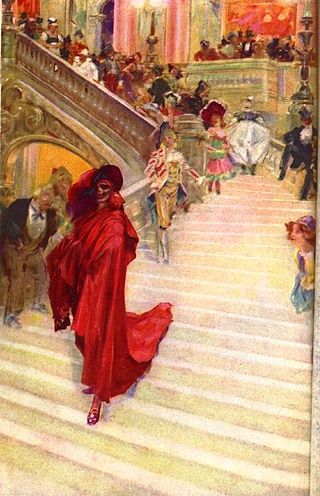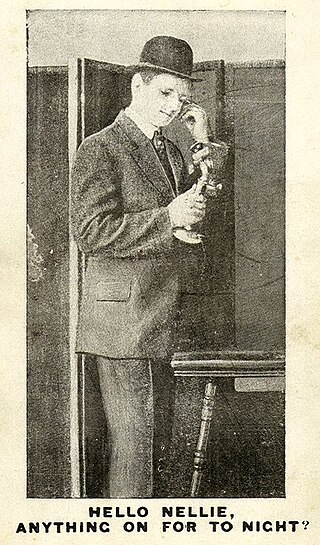
A motto is a sentence or phrase expressing a belief or purpose, or the general motivation or intention of an individual, family, social group, or organisation. Mottos are usually found predominantly in written form, and may stem from long traditions of social foundations, or from significant events, such as a civil war or a revolution. One's motto may be in any language, but Latin has been widely used, especially in the Western world.

A novella is a narrative prose fiction whose length is shorter than most novels, but longer than most novelettes and short stories. The English word novella derives from the Italian novella meaning a short story related to true facts.
Webster's Dictionary is any of the English language dictionaries edited in the early 19th century by Noah Webster (1758–1843), an American lexicographer, as well as numerous related or unrelated dictionaries that have adopted the Webster's name in his honor. "Webster's" has since become a genericized trademark in the United States for English dictionaries, and is widely used in dictionary titles.
Literal and figurative language is a distinction that exists in all natural languages; it is studied within certain areas of language analysis, in particular stylistics, rhetoric, and semantics.

The Phantom of the Opera is a novel by French author Gaston Leroux. It was first published as a serial in Le Gaulois from 23 September 1909 to 8 January 1910, and was released in volume form in late March 1910 by Pierre Lafitte. The novel is partly inspired by historical events at the Paris Opera during the nineteenth century, and by an apocryphal tale concerning the use of a former ballet pupil's skeleton in Carl Maria von Weber's 1841 production of Der Freischütz. It has been successfully adapted into various stage and film adaptations, most notable of which are the 1925 film depiction featuring Lon Chaney, and Andrew Lloyd Webber's 1986 musical.

Roman à clef, French for novel with a key, is a novel about real-life events that is overlaid with a façade of fiction. The fictitious names in the novel represent real people, and the "key" is the relationship between the non-fiction and the fiction. This metaphorical key may be produced separately—typically as an explicit guide to the text by the author—or implied, through the use of epigraphs or other literary techniques.
This article contains information about the literary events and publications of 1891.
This article contains information about the literary events and publications of 1654.

Merriam-Webster, Incorporated is an American company that publishes reference books and is mostly known for its dictionaries. It is the oldest dictionary publisher in the United States.
Deaf-mute is a term which was used historically to identify a person who was either deaf and used sign language or both deaf and could not speak. The term continues to be used to refer to deaf people who cannot speak an oral language or have some degree of speaking ability, but choose not to speak because of the negative or unwanted attention atypical voices sometimes attract. Such people communicate using sign language. Some consider it to be a derogatory term if used outside its historical context; the preferred term today is simply deaf.

Tarjei Vesaas was a Norwegian poet and novelist. Vesaas is widely considered to be one of Norway's greatest writers of the twentieth century and perhaps its most important since World War II.

Hydromancy is a method of divination by means of water, including the color, ebb and flow, or ripples produced by pebbles dropped in a pool.
The Vedanga are six auxiliary disciplines of Hinduism that developed in ancient times and have been connected with the study of the Vedas:
A campus novel, also known as an academic novel, is a novel whose main action is set in and around the campus of a university. The genre in its current form dates back to the early 1950s. The Groves of Academe by Mary McCarthy, published in 1952, is often quoted as the earliest example, although in Faculty Towers: The Academic Novel and Its Discontents, Elaine Showalter discusses C. P. Snow's The Masters, of the previous year, and several earlier novels have an academic setting and the same characteristics, such as Willa Cather's The Professor's House of 1925; Régis Messac's Smith Conundrum, first published between 1928 and 1931; and Dorothy L. Sayers' Gaudy Night of 1935.

Enoc Huws is a classic novel by Daniel Owen, written in the Welsh language and first published in 1891. It was serialised in Y Cymro prior to publication in book form. It has been adapted for stage and television.
Osman Lins was a Brazilian novelist and short story writer. He is considered to be one of the leading innovators of Brazilian literature in the mid 20th century.

Hello is a salutation or greeting in the English language. It is first attested in writing from 1826.
In the lineal kinship system used in the English-speaking world, a niece or nephew is a child of an individual's sibling or sibling-in-law. A niece is female and a nephew is male, and they would call their parents' siblings aunt or uncle. The gender-neutral term nibling has been used in place of the common terms, especially in specialist literature.

Hard Facts is a 1944 novel by the British writer Howard Spring. A young curate is sent to work in Manchester, where he encounters the Dunkersly family who own a struggling printing firm. It was followed by a sequel Dunkerley's in 1946.
In ancient Greek mythology, Rhodopis and Euthynicus are two sworn hunters who incurred the wrath of Aphrodite, the goddess of love and beauty. Their myth is attested in two late sources; Leucippe and Clitophon, a Greek second century AD romance novel by Achilles Tatius, and the Byzantine Drosilla and Charikles novel by Niketas Eugenianos, written in the twelfth century.










